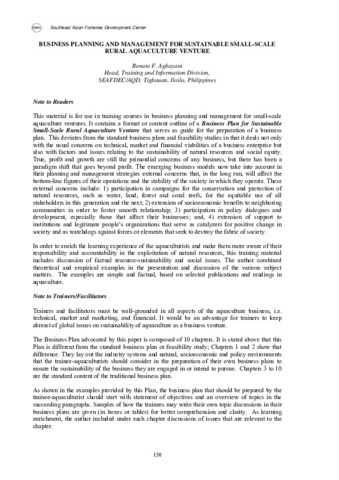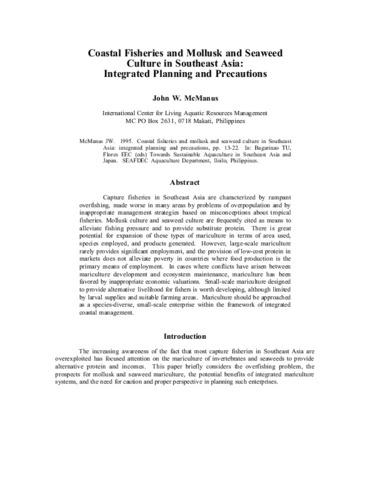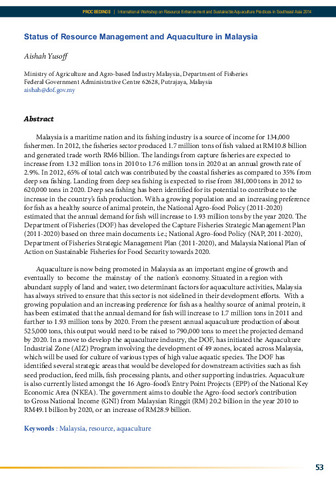ສະແດງບັນທຶກທີ່ງ່າຍດາຍສໍາລັບລາຍການ
Business planning and management for sustainable small-scale rural aquaculture venture
Share
| dc.contributor.author | Agbayani, Renato F. | |
| dc.date.accessioned | 2019-03-26T06:05:30Z | |
| dc.date.available | 2019-03-26T06:05:30Z | |
| dc.date.issued | 2008 | |
| dc.identifier.citation | Agbayani, R. F. (2008). Business planning and management for sustainable small-scale rural aquaculture venture. In Handbook on Community-based Aquaculture for Remote Rural Areas of Southeast Asia (pp. 150-173). Bangkok, Thailand: Secretariat, Southeast Asian Fisheries Development Center. | en |
| dc.identifier.isbn | 9789741387359 | |
| dc.identifier.uri | http://hdl.handle.net/20.500.12066/4655 | |
| dc.description.abstract | This material is for use in training courses in business planning and management for small-scale aquaculture ventures. It contains a format or content outline of a Business Plan for Sustainable Small-Scale Rural Aquaculture Venture that serves as guide for the preparation of a business plan. This deviates from the standard business plans and feasibility studies in that it deals not only with the usual concerns on technical, market and financial viabilities of a business enterprise but also with factors and issues relating to the sustainability of natural resources and social equity. True, profit and growth are still the primordial concerns of any business, but there has been a paradigm shift that goes beyond profit. The emerging business models now take into account in their planning and management strategies external concerns that, in the long run, will affect the bottom-line figures of their operations and the stability of the society in which they operate. [Extract] | en |
| dc.publisher | Secretariat, Southeast Asian Fisheries Development Center | en |
| dc.relation.ispartofseries | SEC/SP/90 | en |
| dc.subject | Philippines | en |
| dc.subject | South East Asia | en |
| dc.subject | pricing | en |
| dc.title | Business planning and management for sustainable small-scale rural aquaculture venture | en |
| dc.type | Book chapter | en |
| dc.citation.spage | 150 | |
| dc.citation.epage | 173 | |
| dc.subject.asfa | aquaculture | en |
| dc.subject.asfa | Financial management | en |
| dc.subject.asfa | management | en |
| dc.subject.asfa | Small scale aquaculture | en |
| dc.subject.asfa | marketing | en |
| dc.subject.asfa | socioeconomic aspects | en |
| dc.subject.asfa | water resources | en |
| dc.subject.asfa | sustainable fishing | en |
| dc.subject.asfa | FAO Code of Conduct for Responsible Fisheries | en |
| dc.subject.asfa | international organizations | en |
| dc.subject.asfa | international agreements | en |
| dc.subject.asfa | human resources | en |
| dc.subject.asfa | economic analysis | en |
| dc.subject.asfa | economics | en |
| dc.subject.asfa | cost analysis | en |
| dc.subject.asfa | Investments | en |
| dc.subject.asfa | production costs | en |
| dc.subject.asfa | environmental impact | en |
| dc.subject.asfa | aquaculture economics | en |
| dc.subject.asfa | freshwater aquaculture | en |
| dc.citation.bookTitle | Handbook on Community-based Aquaculture for Remote Rural Areas of Southeast Asia | en |




